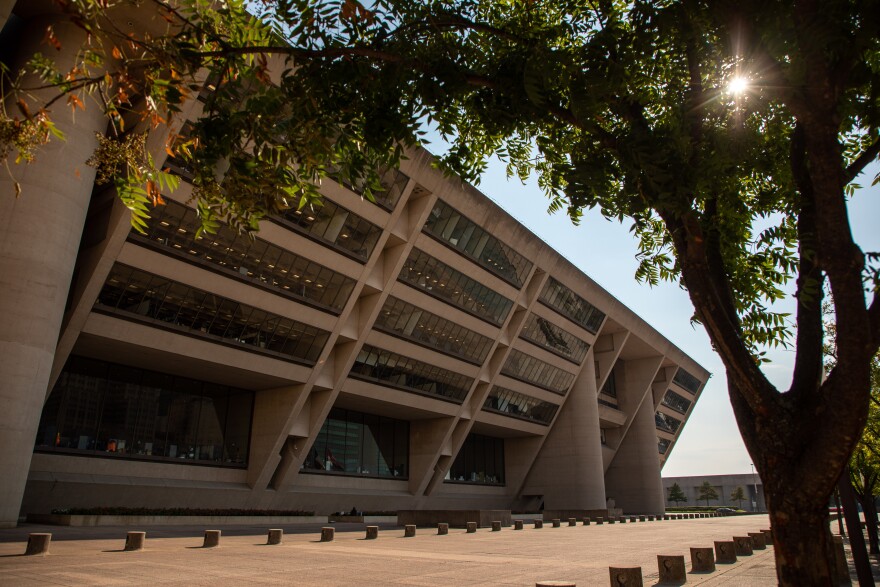The budget includes significant funding for public safety. The bulk of those funds — more than a third of the entire general fund budget — will go to the Dallas Police Department, allowing it to add 250 police officers, buy more police squad cars and increase officer pay.
The budget will also fund more 911 call operators and increase their pay, and buy new ambulances for Dallas Fire-Rescue. Firefighters will get raises as well as EMT training, and two non-police public safety programs focused on violence reduction and helping people experiencing mental health crises were reauthorized.
“Today, we put public safety first,” Dallas Mayor Eric Johnson said. “While no budget is perfect, we are providing the resources that our police chief needs to be successful while also supporting community-based initiatives that can help reduce crime and strengthen our neighborhoods."
Public Safety Debate
Against the backdrop of a deadly shooting in Deep Ellum over the weekend and a general rise in violent crime in Dallas, council members expressed strong support for increasing funding for the police department.
"Our constituents desire now to sleep at night, they want to walk their kids to school in the morning, they want to jog, they want to take their dogs for a walk without being harmed," said Council member Carolyn King Arnold.
A last-minute amendment supported by Mayor Johnson added $10 million to the police overtime budget, raising the total allocation to $28 million.
The mayor called the overtime funding "our backstop against raising violence in our city.”
Mothers Against Police Brutality co-founder Sara Mokuria disagrees.
"This budget is an investment in violence," Mokuria said in a statement. "DPD has consistently proven to be an ineffective intervention for creating a safe public. More money into an unaccountable police force will cause more violence."
Equity & Sustainability Efforts
Bolstered by $355 million in federal pandemic aid, the city is making significant one-time investments, including a $25 million contribution to an ambitious regional plan to house people experiencing homelessness. The city council also approved funds to help develop and preserve affordable housing in Dallas.
There are environmental and sustainability investments including a solar energy pilot project and new air quality monitors. Plus, funding for efforts to enhance quality of life, like improved trash pickup, more code compliance officers and increased walkability.
The city is also seeking to be more equitable by improving broadband, sewer and water service in underserved areas, and installing Wi-Fi in city parks.
"We’re starting to see true equity happening across the city of Dallas, but it’s a slow and it’s a hard process," Council member Omar Narvaez said.
Business Development & Property Taxes
There are new staff positions to speed up business and development permitting, as well.
“The budget reflects real investments that the city council is making in the Dallas to respond to immediate needs and prepare for the future,” Dallas Chief Financial Officer Elizabeth Reich said.
The council also voted to lower the city’s property tax rate for the next fiscal year. This is the fifth year in a row that the city has reduced the tax rate.
The new rate is 77.33 cents per $100 valuation, which would amount to a $2,127 tax bill for the typical $275,000 home. That does not include taxes from the county, school districts or other jurisdictions.
Despite that lower tax rate, most city residents can expect to see their tax bills go up because of gains in home values over the past year. The lower tax rate is expected to net the city as much as $48 million in additional tax revenue.
Increased Fees & New Holidays
The council members voted to raise several fees charged by the city for restaurants and other food vendors, bars and clubs, some foster families and water utility customers.
As part of the budget process, the council also raised the minimum wage for all city employees to $15.50, and allowed for promotions and raises for some police, fire and civilian employees.
Three new paid holidays for city workers were added to the calendar: Juneteenth (June 19), Indigenous People’s Day (Oct. 11) and Veteran’s Day (Nov. 11).
Reich estimated that the new holidays would cost Dallas between $500,000 and $600,000 each year.
The new budget and property tax rates take effect Oct. 1.
Got a tip? Christopher Connelly is KERA's One Crisis Away Reporter, exploring life on the financial edge. Email Christopher at cconnelly@kera.org.You can follow Christopher on Twitter @hithisischris.
KERA News is made possible through the generosity of our members. If you find this reporting valuable, consider making a tax-deductible gift today. Thank you.






